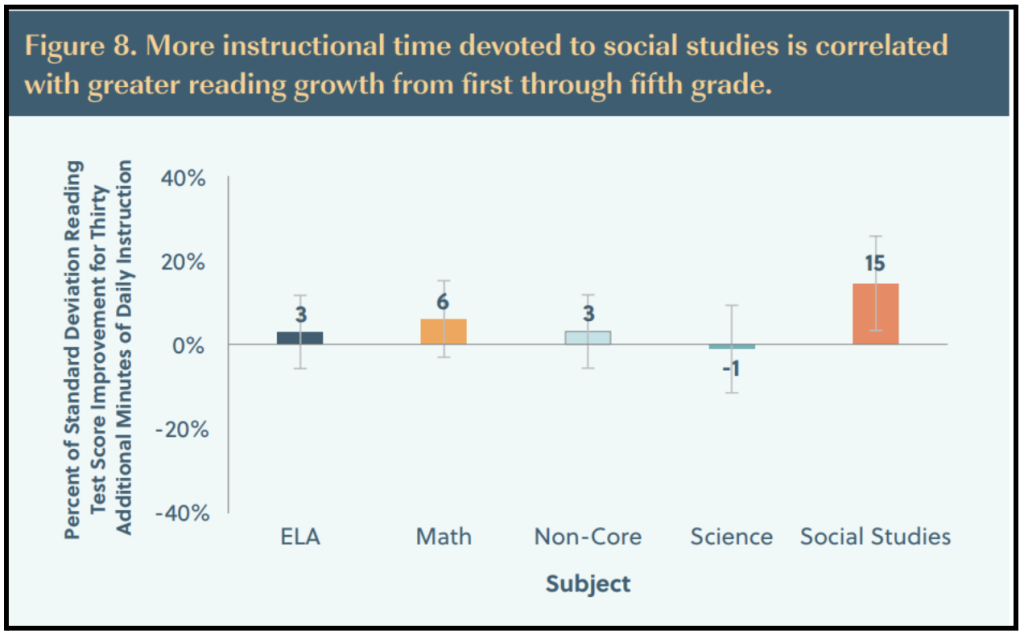Elementary teachers lay the foundation for instilling a lifelong love of learning and a deep understanding of foundational skills about the world around us. The task is huge and comes with substantial pressure to ensure test scores are up and everyone is demonstrating proficiency in reading and math. This pressure, understandably, can sometimes result in reduced instructional minutes devoted to Social Studies, an untested core subject in elementary school. In some instances, this reduction can even be an administrative directive. However, it is critical that district personnel, principals, and teachers work toward a more just balance between Social Studies and other content areas.
Why Shift Our Focus?
Social Studies is so much more than the rote memorization of names and dates. It promotes students’ conceptual thinking abilities, equips them to be critical consumers of media, and boosts interpersonal relationships. This has both a positive and significant effect on literacy and enhances access to academic success for all learners.
Consider the following conclusion from the Federal Early Childhood Longitudinal Study, Kindergarten Class of 2010–11. The study provides insight into the link between Reading proficiency and Social Studies instruction.
Social studies is the only subject with a clear, positive, and statistically significant effect on reading improvement. On average, students who receive an additional thirty minutes of social studies instruction per day, in grades 1 – 5, outperform students with less social studies time by 15 percent of a standard deviation on the fifth-grade reading assessment, even after controlling for multiple measures.

(Griffith et al., 2020)
It is easy to grasp why this strong link between Reading and Social Studies exists.
Social Studies provides students with background knowledge and ultimately levels the playing field for all students. This underscores the fact that the effective teaching of Social Studies is an issue of equity. (Wexler, N. 2020). Therefore, we should all work to ensure Social Studies receives sufficient time, focus, and regard.
What Can Admin Do?
Much of this required work falls on the shoulders of campus administration who must commit to being advocates for Social Studies.
A great place to start is explicitly communicating support for the teaching of Social Studies to teachers and community members. This can look like investing in professional learning surrounding Social Studies standards and practices so teachers feel well-equipped to provide the best learning experiences to their students.
It can also look like sharing research with Central Office Staff about the effectiveness and importance of Social Studies and ensuring Instructional coaches have opportunities to coach teachers during Social Studies time.
What Can Teachers Do?
For teachers who want to spend more classroom instructional time on Social Studies but are not sure where to start, consider some of the following instructional approaches:
Balance the Narrative with Historical Processes
As with the teaching of any content, start with the TEKS to see what content should be taught and at what depth. Pay close attention to the Social Studies Skills strand which outlines content-agnostic processes students should actively be engaging with. For example, if you are doing a Read Aloud with your students on the life of Sojourner Truth, consider pairing the reading with the creation of a class timeline of her life. 1.10(B), 1.16(C)
Use Primary Source Documents
Primary source documents belong in Kindergarten just as much as they do in high school. Students of all ages can view historical images, listen to music from years ago, and engage in historical analysis by generating observations and inferences. For example, the primary source below could be used as an introduction to rules and authority figures K.8(A) and K.8(B). Allow students to pose questions as well as make inferences and connections to present day.

Include Diverse Histories
All students deserve to see capable, heroic, and influential reflections of themselves in the past with regularity. While Heritage Months are an important way to work toward inclusivity, we can always do better and work to include diverse histories throughout the year. Providing students with this connection allows them to see themselves as change agents, as leaders, and empowered to aspire.
Seek out Cross-Curricular Opportunities
Most teachers can easily see the natural connection between Reading Language Arts (RLA) and the Social Studies as both are heavily driven by narrative. However, there are opportunities with Science, Math, Art, and Music too! For example, students can engage in a study of the human consumption of water and the drying up of lakes 3.3(C) while using math to determine the loss of volume over time or represent the data in a bar graph with scaled intervals. 3.7(E), 3.8(A)
Conclusion
As you can see, Social Studies is an essential component to the overall development of students’ improved literacy skills, supporting equity, and strengthening connections to each other, their community, and themselves.
For more information on ESC Region 13 Social Studies, visit our webpage. We offer exciting and timely workshops throughout the year focused on Social Studies.
To stay up-to-date with the latest in Social Studies news and events, subscribe to our monthly newsletter.
References
- Griffith, D., Petrilli, M. J., & Haydel, E. (2020). Social Studies Instruction and reading comprehension: Evidence from the early childhood longitudinal study. The Thomas B. Fordham Institute. https://fordhaminstitute.org/national/resources/social-studies-instruction-and-reading-comprehension
- [police officer on horse]. The Library of Congress. (n.d.). https://www.loc.gov/item/2021636531/
- Wexler, N. (2020). The knowledge gap: The hidden cause of America’s broken education system– and how to fix it. Avery, an imprint of Penguin Random House LLC.

Melissa Solis
Melissa Solis is an instructional coach with ESC 13 and has 15 years of experience in education. Melissa loves supporting teachers in strategically addressing teacher-identified goals and working in tandem to facilitate effective learning opportunities for students.





Add comment